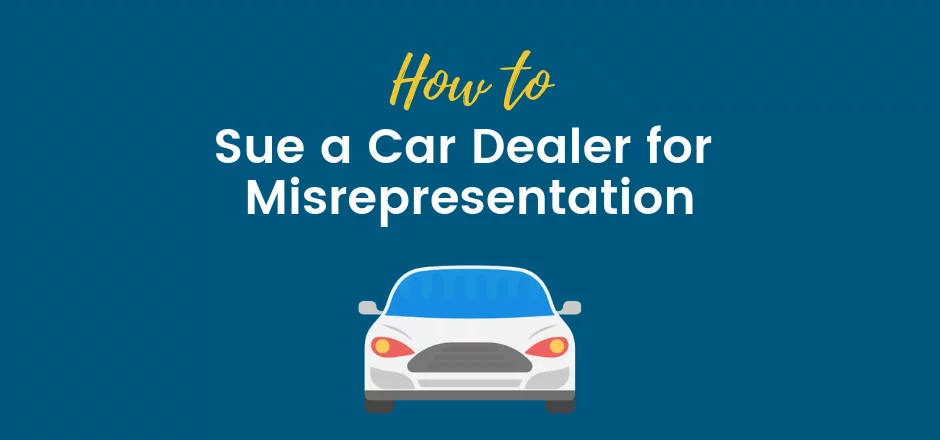How to Sue a Car Dealer for Misrepresentation
If you recently purchased a vehicle and feel you were defrauded by the dealer, you may want to take legal action.
Here’s how to sue a car dealer for misrepresentation
How to Sue a Car Dealer for Misrepresentation
You did your homework and were careful to choose a dealership with a great reputation. You even scored a great deal on your new car – but now it’s turning out to be a complete lemon. Or, maybe you’ve learned it was in an accident only after you bought it, and the dealership is refusing to let you return it.
Whatever your reason for reading this article, one fact holds true: some dealerships seem to have no scruples about ripping off their patrons. While the vast majority are honest and respectful of your time and money, some are just out to make a quick buck – and they aren’t afraid to scam you in the process.
If that happens to you, you may want to find a lawyer and consider suing the car dealer for misrepresentation.
What Is Vehicle Fraud or Car Dealer Misrepresentation?
Car dealer misrepresentation occurs whenever dealers use deceptive and unlawful tactics before, during, or after the sales process. This includes bait and switch tactics, lying about a vehicle’s history, refusing to provide included services, rolling back the odometer, or otherwise lying about the vehicle’s worth.
Federal and state laws protect citizens from dealership fraud by allowing buyers to sue the dealership for misrepresentation. As long as you can prove you experienced some kind of loss, you probably have a case.
What is Loss?
For the purposes of the law, “loss” (sometimes called “damages”) is generally considered financial – but this isn’t always true. Furthermore, how you accumulate the loss may vary.
For example, someone who spends $20,000 on a vehicle only to find out it’s only worth $5,000 “lost money” by purchasing the vehicle for an inflated price. This is the most common form of loss associated with dealerships.
But loss can, and often does, occur in other ways. If you purchase a car that turns out to be a lemon, only to have it break down and cause you to miss work, you may lose out on that day’s income. This scenario could give you the ability to demand compensation for that lost income if you can prove it was caused by the vehicle.
Loss can also be indirect, too. If you are harmed in an accident directly caused by a faulty vehicle you unknowingly purchased (for example, if the dealership sells you a car with faulty brakes), you might get into an accident. If you are harmed, miss work as a result of your injuries, or accumulate medical bills, you can probably sue for damages. The catch is that you must be able to prove the accident occurred because of the dealer’s negligence or misrepresentation.
In other words: you can sue if the dealer lies to you about faulty brakes. You cannot sue if you run a red light and crash into another vehicle.
Why Loss is Difficult to Prove
Loss can be notoriously difficult to prove, especially in vehicle fraud. Generally, in order to succeed in court, the facts omitted must be serious enough that you would not have completed the sale if you had been aware of them. They must also directly relate to whatever form of loss you experienced.
Learning of scratches or peeling paint, for example, isn’t sufficient to sue after an accident where the brakes quit working on the way home from the lot. Discovering that the dealer forgot to properly attach the brake line, on the other hand, would qualify because most people wouldn’t buy a car without working brakes.
The problem for most plaintiffs lies in proving the connection between the misrepresentation or lie and the type of loss experienced. This is why it’s so important to work with a lawyer who understands the nuances of vehicle misrepresentation and fraud – and keep good records, too.
Before You Sue
Before you can sue, you must contact the dealership, express your concerns, and give them the opportunity to correct the problem. In some cases, your case will end here because the misrepresentation was unintentional; the dealer will refund or replace the vehicle, resolving the problem.
If the dealer refuses to work with you, you have additional options before filing an official lawsuit. This includes filing a complaint with your local district attorney’s office, your closest City Attorney, or the California Department of Motor Vehicles (DMV). If any of these parties feel you have a case, they can put pressure on the dealership to correct the problem.
The DMV also retains the right to suspend the dealership’s license if they believe they have committed fraud or misrepresentation. However, it is rare for this to happen prior to a judgment in the plaintiff’s favor in a court of law. In most cases, the DMV will only warn the dealership instead.
Suing a Car Dealer for Misrepresentation
If you have exhausted all other attempts to work the issue out with the dealership, you can bring your case to the civil court. According to the Court of California website, the first step in this process is to figure out whether the dealership is a sole proprietorship, a corporation, or a limited partnership. The exact process for suing each type of business is different.
To sue a sole proprietorship, file the lawsuit against the sole owner of the business. To sue a partnership, you must file against all partners who “own” the business.
If you are suing a corporation, the process to sue is very different. Instead of suing an individual, you sue the business itself instead; corporations are considered separate legal entities for the purposes of civil court.
Most corporations appoint a single representative or a team of lawyers to handle lawsuits. You may have to ask the business for this information. If they refuse, you can find it online via the California Secretary of State’s Business Search portal.
Regardless of which type of entity you need to sue, you still have to file your intention to sue; you can do this through your local courthouse.
After you officially file the complaint against the dealership, you have the legal responsibility to serve them with court papers detailing your intention to sue. You may do this personally or hire a process server to deliver the papers instead. Either way, the papers must be served in person, and not via mail, email, or any other communication channel.
Once the dealership and/or its representatives have been served, they have the opportunity to respond. In some cases, this could include a countersuit, especially if the dealership disagrees with your claims. Your next step should be to consult with a lawyer who can fight to protect your rights no matter how much the dealership refuses to admit fault. It is your right to seek compensation after fraud; a lawyer can help you to ensure you get results.
Find A Lawyer
If you don’t have a lawyer who can help you with this matter, you may be able to find one through an attorney referral service. The SFVBA attorney referral service may be able to connect you with a lawyer in Los Angeles.
Are you in search for a certified attorney to represent you?
Let us help you find one today!





